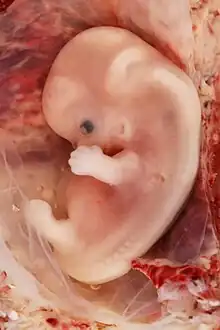embrion
Crimean Tatar
Declension
Declension of embrion
| singular | plural | |
|---|---|---|
| nominative | embrion | embrionlar |
| genitive | embrionnıñ | embrionlarnıñ |
| dative | embrionğa | embrionlarğa |
| accusative | embrionnı | embrionlarnı |
| locative | embrionda | embrionlarda |
| ablative | embriondan | embrionlardan |
Esperanto
Middle French
Etymology
First known attestation 1370-1372 in Les Ethiques en françois a translation of Aristotle by Nicolas Oresme.[1] Presumably borrowed from Ancient Greek ἔμβρυον (émbruon).
References
- Etymology and history of “embryon”, in Trésor de la langue française informatisé [Digitized Treasury of the French Language], 2012.
Polish

embrion
Etymology
Learned borrowing from Ancient Greek ἔμβρυον (émbruon).
Pronunciation
- IPA(key): /ˈɛm.brjɔn/
Audio (file) - Rhymes: -ɛmbrjɔn
- Syllabification: em‧brion
Noun
embrion m inan (related adjective embrionalny)
- (embryology) embryo (fertilized egg before developing into a fetus)
- Synonym: zarodek
Declension
Derived terms
noun
- embrionalizm
Serbo-Croatian
Pronunciation
- IPA(key): /êmbrioːn/
- Hyphenation: em‧bri‧on
This article is issued from Wiktionary. The text is licensed under Creative Commons - Attribution - Sharealike. Additional terms may apply for the media files.
